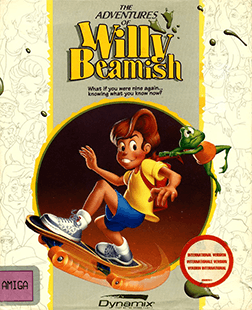The Adventures of Willy Beamish
| The Adventures of Willy Beamish | |
|---|---|
|
Amiga cover art | |
| Developer(s) | Dynamix |
| Publisher(s) | Sierra On-Line |
| Distributor(s) | Activision |
| Engine | Dynamix Game Development System |
| Platform(s) | Amiga, MS-DOS, Macintosh, Sega CD |
| Release date(s) |
1991 (Amiga, MS-DOS) 1992 (Macintosh) 1993 (Sega CD) |
| Genre(s) | Adventure |
| Mode(s) | Single-player |
The Adventures of Willy Beamish is a graphic adventure game developed by Dynamix and published in 1991 by Sierra Entertainment. The player takes on the role of nine-year-old Willy Beamish in a game that somewhat parodies the adventure genre. The game pioneered the use of in-game graphics drawn to resemble classic hand-drawn cartoon animation. It was initially released for MS-DOS and the Commodore Amiga and was ported to the Sega CD in 1993. CD versions of the game complemented the in-game text with speech, and included a few other cosmetic changes. A sequel was reportedly planned starring Willy Beamish as a late teenager, but the project was canceled.
Plot

Willy Beamish is introduced as a brat archetype of early 90s, being the middle child in a typical upper middle class American family, who is obsessed with science fiction, console games and hanging out with his gang in their tree house. His existence is not entirely idyllic, though; he is periodically tormented by a number of people. These include various staff members at Carbuncle Elementary School, a vicious teenaged school bully named Spider, and his two sisters, one of whom is a preschool prodigy and the other of whom is an angsty teen who undergoes a disturbing transformation midway through the game. His parents love him, but are at their wits end with his mischief, and are seriously considering enrolling him in military school. His adventures take place over the first few days of summer vacation, in the (fictitious) American town of Frumpton. He is occasionally visited by his grandfather's ghost, who serves as his conscience.
As the game begins, Willy Beamish is sent to detention on the last day of school; his pet frog "Horny" disrupted the final school assembly by dislodging the principal's toupee. This initial scene is a good example of the game's array of choices presented to the player: Willy can stay in detention until it is over, but then he won't get home in time to pick up the mail and intercept the report card that shows a "C+" in Music Appreciation. To sneak out early, he must forge a hall pass and either avoid the school bully or pacify him by giving him something from Willy's inventory. It is ultimately impossible for Willy to keep the card out of his father's hands, but it is a good exercise in problem solving; Willy will later face challenges that cannot be avoided.
Willy's ambition is to qualify for the national "Nintari" (a portmanteau of Nintendo and Atari) competition. This goal is quickly placed in dire jeopardy: because of the bad grade, his video game privileges are revoked. To further complicate the situation, Willy's father unexpectedly loses his job, the babysitter is a vampire, a street gang terrorizes the town, and a plumbers' revolt is on the horizon.
Later in the game, the threats that Willy faces grow more serious, even lethal, in nature. They range from the brutal (having his arms and legs broken in an attack at a pizza parlor, albeit in a comical manner, being beaten to death by a violent street gang, being drowned) to the more outrageous, yet equally disturbing (being processed into artificial sweetener). In addition, both his frog and his father face mortal perils of their own. If Willy is able to keep everyone out of harm's way and save the town from a sewer system catastrophe, he gains enough money to attend and claim victory in the Nintari championship, which constitutes winning the game.
Despite the fact that it features a nine-year-old as the protagonist, much of the game's humor is adult-oriented, including sexual puns (such as a frog called "Horny"; Willy giving a bully a hand held game system and telling him to "play with himself"; a young blonde school nurse with large breasts) and some satire (including a parody of conservative American talk-radio host Rush Limbaugh). The primary villain in the game is a parody of the late Leona Helmsley, the "Queen of Mean".
Gameplay
Many of the challenges that Willy faces are typical choices that a nine-year-old boy must make: whether to push his little sister on the swingset (and how high to push her), whether to wash his dad's car, and whether to take his dog for a walk. Making unwise choices can produce negative consequences of various sorts. For instance, if Willy does not wash his father's car, he does not receive his allowance, and cannot buy an item that he will need later in the game. In addition, Willy has a score system called the Trouble-O-meter, a thermometer with "Good Boy" at the bottom and "Cadet School" at the top. Actions that annoy Willy's parents will cause the meter to go up one level, and really infuriating them will cause it to go up more. If the mercury reaches "Cadet School", that's where Willy goes, and the game is over.
Other versions
The Sega CD edition of the game was noted for having slow loading times and slightly washed out colors, due to the hardware limitations of the system. In an effort to make up for the slow loading time, the game has a feature where the player can select the "Start" button and manipulate a set of twirling black and white balls, known in the manual as "Laser Balls". A glitch in some editions of the game caused the game to freeze up during certain scenes.
That edition also features a minigame on Willy's Nintari system in his bedroom (in the PC version, playing the Nintari just plays a cutscene of a video game). The minigame, known as Super Space K'Noidtrix, combines elements of Space Invaders, Tetris and Arkanoid.
The "talkie" CD versions of the game, besides adding voice actors, extend the game's introduction and replaced the still character portraits with animated versions. The voice actor who plays Willy Beamish is Michael Zibelman. Additionally, while the floppy PC version offered the option of MT-32 sound and music, the CD version eliminates that option, leaving only Soundblaster and Pro Audio Spectrum as sound options. Certain retail boxes of the game included a mail-in form for a free Willy Beamish-themed wristwatch.
Reception
Charles Ardai wrote in Computer Gaming World in 1993 that the CD-ROM version of Willy Beamish was disappointing compared to the corresponding version of Space Quest IV, with poor voice acting that was, he stated, "insulting to children and inconsiderate of adults, whose skin it will make crawl". Ardai also disliked the game's tone of "smirking, adolescent sexiness" as incongruent with a small child as the hero. He concluded "This is a game best played with the voices turned off. Given that it is a CD-ROM game, that's saying a mouthful".[1]
References
- ↑ Ardai, Charles (May 1993). "Dynamix's The Adventures of Willy Beamish". Computer Gaming World. p. 14. Retrieved 7 July 2014.
